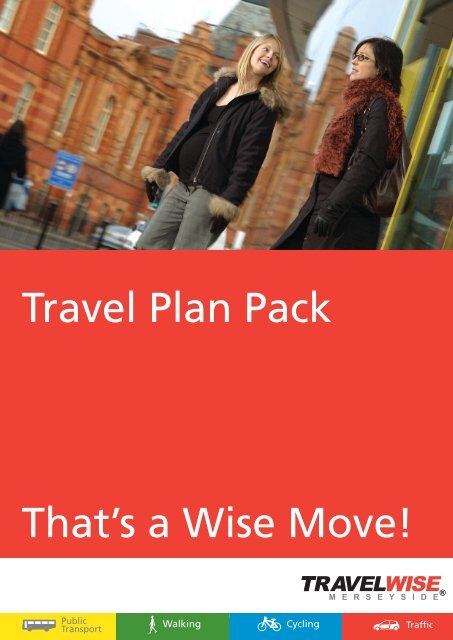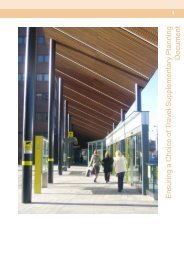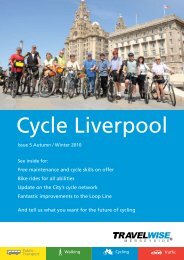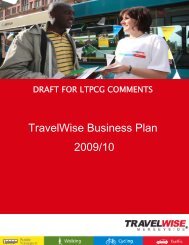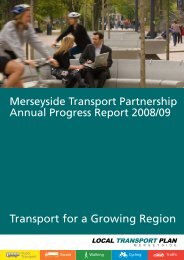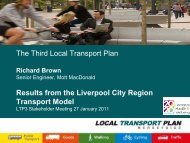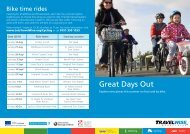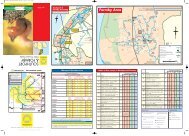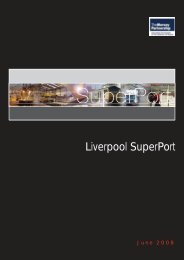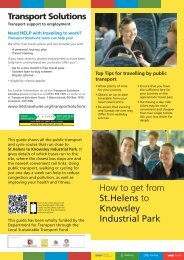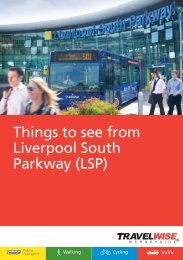Travel Plan Pack - the TravelWise Merseyside website
Travel Plan Pack - the TravelWise Merseyside website
Travel Plan Pack - the TravelWise Merseyside website
Create successful ePaper yourself
Turn your PDF publications into a flip-book with our unique Google optimized e-Paper software.
<strong>Travel</strong> <strong>Plan</strong> <strong>Pack</strong>That’s a Wise Move!1
<strong>Travel</strong>Wise is <strong>the</strong> <strong>Merseyside</strong> Transport Partnership’s Campaign to help people in <strong>Merseyside</strong>make smarter travel choices. <strong>Travel</strong>Wise works with schools, businesses, universities, colleges,hospitals, housing developments and tourist sites to support <strong>Travel</strong> <strong>Plan</strong>s. This improves accessto those sites and also helps reduce congestion and pollution.The <strong>Merseyside</strong> Transport Partnership is investing in this package of support in order to assist<strong>the</strong> <strong>Travel</strong>Wise programme, which has <strong>the</strong> following aims:• To reduce <strong>the</strong> increase in peak hour traffic flows to urban centres and areawide road traffic• To contribute to measures to improve air quality, particularly in relation toexisting and potential future air quality management areas• To improve accessibility for workplaces, health sites and education• To improve public transport patronage through marketing to potential users,and to retain existing markets that are at risk of abstraction• To increase levels of cycling• To increase levels of walking• To increase <strong>the</strong> use of more sustainable modes for trips to school• To achieve road casualty reduction targets• To increase positive perceptions of sustainable modes• To increase stakeholder involvement and supportAfter reading this pack, if you would like an informal discussion, please contact<strong>the</strong> <strong>Travel</strong>Wise team on 0151 330 1855 or visit www.Lets<strong>Travel</strong>Wise.org2
Contents<strong>Travel</strong> <strong>Plan</strong>s <strong>the</strong> background• <strong>Travel</strong> <strong>Plan</strong> <strong>Pack</strong> introduction 4• What is a <strong>Travel</strong> <strong>Plan</strong> 5• What <strong>Travel</strong>Wise can do for you 7• Managing your <strong>Travel</strong> <strong>Plan</strong> 8Current travel patterns• Making informed decisions 10Structure for a <strong>Travel</strong> <strong>Plan</strong>• Your <strong>Travel</strong> <strong>Plan</strong> - template structure 12• Action plan template 18Measures, initiatives and case examples• Your organisation 22• Being pedestrian friendly 24• Encourage cycling 26• Encouraging <strong>the</strong> use of public transport 28• Reducing <strong>the</strong> need to travel 31• Use of car clubs in <strong>the</strong> workplace 33• Car park management 35• Promoting car share 37• Annexe - Assessing your organisation 39Promoting sustainable transport• <strong>Travel</strong>Wise contacts 40• Useful web links 413
<strong>Travel</strong>Wise <strong>Merseyside</strong><strong>Travel</strong> <strong>Plan</strong> <strong>Pack</strong>The <strong>Travel</strong>Wise <strong>Merseyside</strong> pack is intended asa resource for organisations looking todevelop and implement <strong>the</strong>ir own <strong>Travel</strong> <strong>Plan</strong>.The booklet is intended to be a resource whichis appropriate to all types of organisationsincluding public and private sector companies,hospitals, colleges and retail outlets. Somesections may be more relevant than o<strong>the</strong>rs but<strong>the</strong> principle <strong>Travel</strong> <strong>Plan</strong> process is universallyappropriate. This booklet includes informationon <strong>the</strong> stages of <strong>Travel</strong> <strong>Plan</strong> development, withprompts, questions and interactive tools tohelp you complete your <strong>Travel</strong> <strong>Plan</strong>.Please note that <strong>the</strong>re is a separate resourceavailable for developers who need <strong>Travel</strong> <strong>Plan</strong>sas part of <strong>the</strong> planning process. Details can befound on <strong>the</strong> <strong>Travel</strong>Wise <strong>website</strong>:www.Lets<strong>Travel</strong>Wise.org/developments.Stage 4Employee travel survey and facilities auditStage 5Devise specific objectives and targetsStage 6Introduce a tailored package of measures foryour organisationStage 7Monitoring strategyStage 8Review programmeMARKETING AND COMMUNICATION AREKEY AT ALL STAGES THROUGHOUT THETRAVEL PLANKey stages to managing <strong>the</strong> projectIt is important to realise that a <strong>Travel</strong> <strong>Plan</strong> is anon-going process that requires regularreviewing.Stage 1Why you need a <strong>Travel</strong> <strong>Plan</strong>Stage 2Produce your business case to obtain seniormanagement supportStage 3Set up steering group - include keydepartments; personnel, finance, estatesmanagement and fleet managers4
What is a <strong>Travel</strong> <strong>Plan</strong>?A <strong>Travel</strong> <strong>Plan</strong> is a site-specific policy and actionplan for managing transport effectively, with<strong>the</strong> aim of improving access to a site by allmodes of travel, ensuring choice for everyone.By implementing a <strong>Travel</strong> <strong>Plan</strong> you can addressseveral transport issues; commuting, businesstravel, fleet management, business deliveriesand transport contracts.A <strong>Travel</strong> <strong>Plan</strong> is a package of practicalmeasures and incentives, developed byemployers and employees with <strong>the</strong> aim ofreducing car dependency and encouraging <strong>the</strong>use of sustainable modes of transport. Theplan can include improved bicycle facilities, carsharing schemes, support for public transportor changes in parking provision. Departmentfor Transport (DfT) research shows that a welldesignedtravel plan can typically cut 15% ofcommuter car use.On average, <strong>Travel</strong> <strong>Plan</strong>s that addressed carparking resulted in a 24% reduction in <strong>the</strong>proportion of commuter journeys being madeby car. For <strong>Travel</strong> <strong>Plan</strong>s that had not addressedcar parking <strong>the</strong> average reduction was 10%.(DfT Research Report: Making <strong>Travel</strong> <strong>Plan</strong>sWork).Many organisations, both in Britain as well asinternationally, are adopting travel planningas an integral part of <strong>the</strong>ir overall businessstrategy. Across <strong>Merseyside</strong> private companies,Local Authorities, hospitals and GovernmentAgencies are all developing <strong>Travel</strong> <strong>Plan</strong>s.5
Why <strong>Travel</strong> <strong>Plan</strong>s are increasing inimportance• Local authorities increasingly require <strong>Travel</strong><strong>Plan</strong>s through <strong>the</strong> planning process,demonstrating recognition of <strong>the</strong> benefits oftravel planning to business and <strong>the</strong> widercommunity• A workplace with limited accessibility willmake recruitment and retention of staffproblematic• Over-reliance on <strong>the</strong> car means it is notalways <strong>the</strong> most efficient method oftransport, due to rising congestion levelsacross <strong>the</strong> UK. The cost to UK businesses ofdelays and unreliability due to congestion isestimated to cost business over £17.5 billiona year.• The Government has set targets to reducecarbon emissions to avoid dangerous climatechange. <strong>Travel</strong> <strong>Plan</strong>s can help towardsreaching <strong>the</strong>se targets, as currently 73% ofjourneys to work are made by car. Thisproportion has been steadily increasing in all<strong>Merseyside</strong> districts while <strong>the</strong> proportion ofjourneys made by sustainable modes hasdeclined across all modes.• The World Health Organisation has officiallyprescribed each of us moderate exercise forhalf an hour five times a week, which can fitperfectly with walking or cycling to workThe Business case for <strong>Travel</strong> <strong>Plan</strong>sExperience shows that <strong>the</strong> benefits ofadopting a <strong>Travel</strong> <strong>Plan</strong> can be extensive. Yourorganisation, its staff, its customers and yourwider local community all stand to gain from<strong>the</strong>ir implementation.<strong>Travel</strong> <strong>Plan</strong>s can give your organisation acompetitive advantage by:• Solving problems caused by demand forparking• Saving money on <strong>the</strong> cost of providing andmaintaining car parking spaces• Cutting mileage claims and o<strong>the</strong>r businesstravel costs• Reducing <strong>the</strong> costs of running a fleet• Solving problems caused by trafficcongestion in and around your site• Improving your image with both customersand stakeholders• Improving staff health, which in turn couldreduce absenteeism• Assuring parking for those who most needaccess to a vehicle• Freeing up land used for car parks to beutilised more productively• Meeting corporate goals e.g. corporate andsocial responsibility, quality assurance andenvironmental management6
What we can dofor you?<strong>Travel</strong>Wise <strong>Merseyside</strong> offers a range of support services to help you develop your<strong>Travel</strong> <strong>Plan</strong>. We can:• Provide single point of enquiry for travelneeds• Provide expert one to one advice - A<strong>Travel</strong>Wise advisor will be assigned to yourcompany to take you through developingyour <strong>Travel</strong> <strong>Plan</strong>• Share resources and best practice, e.g. our<strong>Travel</strong> <strong>Plan</strong> pack, <strong>Travel</strong> <strong>Plan</strong> self-assessmenttool, free on-line survey facility, action plans,suggested structure and site audits• Offer <strong>the</strong> <strong>Travel</strong>Wise grant scheme to helpfund your <strong>Travel</strong> <strong>Plan</strong> initiatives (conditionsapply)• Provide staff with Personal Journey <strong>Plan</strong>ners• Inform on latest national and local policydevelopments, events and governmentgrants• Liaise with local public and communitytransport operators• Offer free support and advice – <strong>Travel</strong>WiseOfficers will attend <strong>Travel</strong> <strong>Plan</strong> action teammeetings as appropriate, make presentationsto managers and employees, and providelinks to local authorities• Facilitate networking and exchange of goodpractice through regular <strong>Merseyside</strong> <strong>Travel</strong><strong>Plan</strong> Forums• Provide updates via email newsletter• Provide a staff postcode map• Support promotional activities such as on-site<strong>Travel</strong> Fairs• Inform on travel and ticketing schemes• Provide research on particular topics• Publicise and promote successful initiatives• Give you access to <strong>the</strong> Wise Moves Network,giving exclusive access to <strong>the</strong> <strong>Travel</strong>Wisegrant scheme and our marketing materials<strong>Travel</strong>Wise <strong>Merseyside</strong>LTP Support Unit24 Hatton Garden Liverpool, L3 2ANTel: 0151 330 1253 Fax: 0151 330 1094Email: info@letstravelwise.org www.Lets<strong>Travel</strong>Wise.org7
Managing your <strong>Travel</strong> <strong>Plan</strong>SupportCommitment to <strong>the</strong> <strong>Travel</strong> <strong>Plan</strong> from seniormanagement should be demonstrated from<strong>the</strong> outset. Leading by example is alwayseffective. This can be achieved by personalaction and participation within project groups.It may prove easier to get senior managementcommitment if you first develop a businesscase for <strong>the</strong> <strong>Travel</strong> <strong>Plan</strong>. Senior managementmay view <strong>the</strong> plan more favourably when <strong>the</strong>yunderstand <strong>the</strong> financial, social and politicalbenefits. It is important for everyone tounderstand <strong>the</strong> need for a <strong>Travel</strong> <strong>Plan</strong> at anearly stage, and how it will benefit everyone.Building support from employeesrequires:• Their understanding of <strong>the</strong> aims of <strong>the</strong><strong>Travel</strong> <strong>Plan</strong>• The <strong>Plan</strong> to be prepared with <strong>the</strong>ir activeparticipation ensuring wide ownership• Their representatives, including trade unions,to be involved with <strong>the</strong> steering group• Their understanding of <strong>the</strong> benefits it willbring to <strong>the</strong>m both individually andcollectively, and financially• That <strong>the</strong> <strong>Travel</strong> <strong>Plan</strong> takes into accountemployees' views, and that it contains fairproposals• Their appreciation of <strong>the</strong> <strong>Travel</strong> <strong>Plan</strong> notbeing anti-car – it is about using all modes oftransport, including cars, more wisely8
CommunicationGood communication is essential to asuccessful <strong>Travel</strong> <strong>Plan</strong>. Ensuring <strong>the</strong> positiveintroduction of <strong>the</strong> subject is an importantfirst step. <strong>Travel</strong>Wise <strong>Merseyside</strong> can supplyleaflets, posters and and displays to help raiseawareness and to stress <strong>the</strong> positive aspects ofa <strong>Travel</strong> <strong>Plan</strong>. Publicity of each measure as it isintroduced (and ongoing encouragement andreminders to take action) will ensure success.This effort must be sustained throughout <strong>the</strong>implementation of <strong>the</strong> plan. Somecommunication ideas include:• Newsletters and magazines• E-mail and intranet• Bulletin boards to display posters• <strong>Travel</strong> Fairs - providing information, adviceand promoting special offers or newincentives• Team briefings• Open meetings and discussion groups• Pay slips messages or attachments fordistribution of information• PR events e.g. senior management leadingby example• Publication of survey results, success ofmeasures and employee accounts• Employee recruitment and inductioninformation to incorporate <strong>the</strong> <strong>Travel</strong> <strong>Plan</strong>and information on access to all travel modes• Links to wider events such as Bike Week,health campaigns and <strong>Travel</strong>Wise Week(<strong>Travel</strong>Wise will let you know more about<strong>the</strong>se)Resources needed<strong>Travel</strong> <strong>Plan</strong> measures are cost effective solutionsto transport and parking managementproblems. Initial start-up costs may be offset,for instance, by savings in car park subsidies.Recent alterations to company car allowancesand taxes on travel arrangements make <strong>Travel</strong><strong>Plan</strong> measures even more financially attractive.Time is required from employees in order toprepare and implement a <strong>Travel</strong> <strong>Plan</strong>. It isuseful to nominate an individual to co-ordinate<strong>the</strong> project and set up an action group,responsible for taking <strong>the</strong> project fur<strong>the</strong>r. Inlarge organisations a nominated representativewithin each department may be on <strong>the</strong> actiongroup and act as a point of contact.9
Making informed decisionsIn deciding what measures and initiatives aremost appropriate for your organisation, youneed to understand your organisation’scurrent travel patterns and how transport isaffecting you. This information is useful formaking <strong>the</strong> business case for initiatives youpropose. You can do this by carrying out a siteassessment, a survey of employee travelpatterns and an audit of o<strong>the</strong>r related travel.An accurate picture of travel patterns and anunderstanding of <strong>the</strong> factors that influence aperson's choice of travel will be reached. Theinvolvement of keen and enthusiasticindividuals will ensure <strong>the</strong> completion of<strong>the</strong> work.Assessment of current practiceFirstly, an assessment of your site’s currenttransport infrastructure and systems alongwith transport subsidies is required. In <strong>the</strong>annex of <strong>the</strong> booklet is a simple audit formwhich can help your organisation. Most of <strong>the</strong>information is likely to be readily availablewithin your organisation. O<strong>the</strong>r departments(such as personnel, finance and estatemanagement) will be able to help with datacollection. Involving o<strong>the</strong>r departments is apositive move as it raises awareness of <strong>the</strong><strong>Travel</strong> <strong>Plan</strong>. It can help to give a sense ofownership within <strong>the</strong> organisation and alsohelp to recruit colleagues onto <strong>the</strong> steeringgroup. <strong>Travel</strong>Wise can provide some of thisinformation, such as details of publictransport, walking and cycling routes.Wise Moves NetworkAs a member of Wise Moves Network you willhave exclusive access to a number of benefits.A free on-line travel survey, bespoke to yourneedsThis employee survey ga<strong>the</strong>rs data about howyour employees currently travel to work, <strong>the</strong>iropinions on transport and identifies which<strong>Travel</strong> <strong>Plan</strong> measures will be most effective.Questions can be modified to address yourorganisation’s specific needs. An on-line surveypackage including a library of questions isavailable to assist you in developing a surveyspecific to your site. Results will automaticallybe analysed, providing you with fast results.Free <strong>Travel</strong>Wise <strong>Merseyside</strong> marketing materialsAs a Wise Moves member you can orderposters, postcodes maps, mousemats, drinkscoasters, leaflets and a whole host of o<strong>the</strong>rpromotional material to display and distributethroughout your organisation in support ofyour travel plan.Bespoke marketing resources such as‘<strong>Travel</strong>Wise’ guides which detail how to reachyour site by all modes, and posters / flyers mayalso be available.Free <strong>Travel</strong> <strong>Plan</strong> Forums<strong>Travel</strong>Wise <strong>Merseyside</strong> organises three forumsa year for organisations that want toimplement <strong>the</strong>ir <strong>Travel</strong> <strong>Plan</strong>s. These freeforums are an opportunity to keep up withtravel developments, share best practice witho<strong>the</strong>r <strong>Merseyside</strong> organisations and Partnerswho can help you make your organisation's<strong>Travel</strong> <strong>Plan</strong> a success.Postcode mapping serviceThis service assesses which employees livewithin a reasonable walking or cyclingdistance from your workplace. It highlightslinks to bus and road routes, and identifiespotential car sharers for those who live fur<strong>the</strong>rafield.<strong>Travel</strong>Wise Discounts<strong>Travel</strong>Wise have organised discounts at a numberof cycle shops for cycles, cycle equipment, cyclerepair and services to members of Wise MovesNetwork. Discounts for <strong>the</strong> individual employeeare granted on <strong>the</strong> provision of <strong>the</strong>organisation’s staff identity card.10
Mode based marketing plans and free resources<strong>Travel</strong>Wise <strong>Merseyside</strong> has developed modebased marketing plans which outline severalpromotions focusing on different modes oftravel throughout <strong>the</strong> year. These promotionsare designed to assist in <strong>the</strong> ongoingimplementation of your organisation’s<strong>Travel</strong> <strong>Plan</strong>.Personalised Journey <strong>Plan</strong>ning ServiceYou can access Merseytravel’s personal journeyplanning service – free to all your staff as partof your organisation’s <strong>Travel</strong> <strong>Plan</strong>.To become a member of <strong>the</strong> Wise MovesNetwork, please visitwww.Lets<strong>Travel</strong>Wise.org/wisemovesYour next stepsWith all <strong>the</strong> collated information, you canbegin to design and implement <strong>the</strong> measuresand initiatives that are best suited to yourorganisation. The initial measures must focuson encouragement, making alternatives todriving more attractive, promoting car sharingand supporting those who don't drive.Restrictive measures, such as reducing parkingprovision, will be necessary to achieve widersuccess. Initiatives that save time and moneyare <strong>the</strong> most likely to influence people's travelbehaviour.A good <strong>Travel</strong> <strong>Plan</strong> will incorporate a widevariety of measures over time to attractdifferent people. <strong>Travel</strong>Wise <strong>Merseyside</strong> isalways willing to offer advice and makesuggestions on your plan.Issues to consider:• Your working practices for new and existingemployees• Working hours and opportunity forteleworking and teleconferencing• The inclusion of transport within yourenvironmental management system• Encouraging public transport for businesstrips• Mileage payments for trips by bicycle ra<strong>the</strong>rthan by car• Provision of loan and subsidy schemes forpublic transport season tickets and bikepurchases• Parking management, considering allocationand current criteria for priority parking• Provision of parking for both bicycles andmotorcyclesMonitoring and EvaluationMonitoring progress of your scheme is veryimportant and a requirement of planningobligations for <strong>Travel</strong> <strong>Plan</strong>s. You need tounderstand <strong>the</strong> effect <strong>the</strong> measures arehaving, which approaches have been costeffective and what successes have been made.Survey data will establish baseline figures toenable realistic targets to be set in <strong>the</strong> planand to measure actual change over time.11
Your <strong>Travel</strong> <strong>Plan</strong>Template Structure1.0 IntroductionNature of business and backgroundAims/aspirations of your <strong>Travel</strong> <strong>Plan</strong>Roles & responsibilitiesSite locationEmployee/visitor/resident numbersDevelopment proposalsInformation from survey and site audit shouldbe used to set <strong>the</strong> sceneWhy are you developing a <strong>Travel</strong> <strong>Plan</strong>?How does it fit in with your companystrategies and policies?Dedicated <strong>Travel</strong> <strong>Plan</strong> Co-ordinatorSteering/Action Group - list key players toguarantee commitment<strong>Travel</strong> <strong>Plan</strong> should have senior managementsupport and approval2.0 Objectives and Measures of <strong>the</strong> <strong>Travel</strong> <strong>Plan</strong>State <strong>the</strong> specific objectives of <strong>the</strong> <strong>Travel</strong> <strong>Plan</strong> for your organisation. Actions and initiatives setout within <strong>the</strong> plan, toge<strong>the</strong>r with targets to measure success, should aim to meet <strong>the</strong>seobjectives.2.1 Public TransportCurrent levels of public transport useCurrent facilities for public transportWhat would encourage use of publictransport to work and for work relatedjourneys?Proportion of employees living within accessof public transport links / outside <strong>Merseyside</strong>Survey responsesSite assessment and auditSurvey responsesProportion of employees living within 5 milesof <strong>the</strong> site and close proximity of rail station -postcode map can be used for thisinformation (ask <strong>Travel</strong>Wise)12
Set target to increase level of use of publictransportWhat initiatives will help to achieve thistarget?(include within Action <strong>Plan</strong>)FundingMarketing% using public transport to get to site by yearX(<strong>Travel</strong>Wise can advise on realistic targets byusing survey and postcode information)Provision of information on siteProvision of information at inductionTicketing schemesPhased approach for measures over a 3 yearperiodBudget requirementTax implicationEffective promotion of initiatives and benefitsof sustainable travel choices2.2 CyclingCurrent levels of cyclingCurrent facilities for cyclingWhat would encourage cycling to work andfor work journeys?Numbers living within a realistic cycle distance(3 miles)Set target to increase levelWhat initiatives will help to achieve thistarget?(include within Action <strong>Plan</strong>)FundingMarketingSurvey responsesSite assessment and auditSurvey responsesThis can be greatly expanded by incorporatingrail - postcode map can be used for thisinformation (ask <strong>Travel</strong>Wise)% cycling to site by year X(<strong>Travel</strong>Wise can advise on realistic targets byusing survey and postcode information)Improved cycle storageOffering cycle trainingProvide cycle mileage allowanceProvide interest free loan to buy bikesPhased approach for measures over a 3 year periodSalary-sacrifice schemeBudget requirementTax implicationEffective promotion of initiatives13
2.3 WalkingCurrent levels of walkingCurrent facilities for walkingWhat would encourage walking to work andfor work journeys?Numbers living within a realistic walkingdistance (1 mile)Set target to increase levelWhat initiatives will help to achieve thistarget?(include within Action <strong>Plan</strong>)FundingMarketingSurvey responsesSite assessment and auditSurvey responsesThis can be greatly expanded by incorporatingwith rail - postcode plot can be used for thisinformation (ask <strong>Travel</strong>Wise)% walking to site by year X(<strong>Travel</strong>Wise can advise on realistic targets byusing survey and postcode information)Provision of information on walking routesEncouragement of lunchtime walksOffer pedometersPhased approach for measures over a 3 yearperiodBudget requirementTax implicationEffective promotion of initiatives2.4 Car ParkingCurrent levels of drivingCurrent facilities for car parking andmotorcycle parkingWhat would encourage alternatives to drivingand for work journeys?Set target to decrease levelWhat initiatives will help to achieve thistarget?(include within Action <strong>Plan</strong>)FundingMarketingSurvey responsesCar parking management policy, siteassessment and auditNote <strong>the</strong> number of spaces for cars,motorcycles and disabled drivers for bo<strong>the</strong>mployees and visitorsSurvey responses% of lone drivers to work by year X(<strong>Travel</strong>Wise can advise on realistic targets byusing survey and postcode information)Private car sharing groupDedicated parking baysGuaranteed ride home schemeIncentivesPhased approach for measures over a 3 year periodIntroducing car parking charges / permit schemesBudget requirementTax implicationEffective promotion of initiatives14
2.5 Car ShareCurrent levels of car sharingCurrent facilities for car sharingWhat would encourage car sharing forcommuting and business purposes?Numbers of those interested which may makepotential matchSet target to decrease levelWhat initiatives will help to achieve thistarget?(include within Action <strong>Plan</strong>)FundingMarketingSurvey responsesCar parking management policy, siteassessment and auditSurvey responses<strong>Travel</strong>Wise postcode plot can be used for thisinformation% car sharing to site by year XThere is a need to ensure wherever possiblecar share is from lone car and not from moresustainable modes.(<strong>Travel</strong>Wise can advise on realistic targets byusing survey and postcode information)Private car sharing groupDedicated parking baysGuaranteed ride home schemeIncentivesPhased approach for measures over a 3 year periodIntroducing car parking charges / permit schemesBudget requirementTax implicationEffective promotion of initiatives2.6 Business TripsCurrent facilities/policies for business travelCurrent levels of business tripsNumbers of essential and/or car usersWhat would encourage alternatives for worktrips?Set target to decrease levelWhat initiatives will help to achieve thistarget?(include within Action <strong>Plan</strong>)FundingMarketingSite assessment and auditSurvey responses on common journeysPersonnel recordsSurvey responses% of business trips made by sustainablemodes by year X(<strong>Travel</strong>Wise can advise on realistic targets byusing survey and postcode information)Amend or introduce new organisation policiesInterest in pool bikes and carsSharing journeysReview levels of car mileagePhased approach for measures over a 3 yearperiodBudget spend on car mileage and taxisTax implicationEffective promotion of initiatives15
2.7 Reducing Company EmissionsCurrent procedures on vehicle purchasing andleasingCurrent number of vehicles and fuel typeCurrent mileageEmissions from vehiclesCompany policiesSurvey responsesAdministration recordsCurrent vehicle / fleet recordsSet target to decrease levels% decrease in emissions by year XWhat initiatives will help to achieve thistarget?(include within Action <strong>Plan</strong>)FundingMarketingInformation on green driving techniqueswhen registering to drive work vehicleIncorporate into induction processPhased approach for measures over a 3 yearperiodAdjustments to fleetBudget spend on vehiclesTax implicationEffective promotion of initiatives2.8 Reducing <strong>the</strong> Need to <strong>Travel</strong>Current procedures to reduce <strong>the</strong> need totravelCurrent facilities availableHow many long distance commuters andbusiness trips?Response to home working / videoconferencingWhat initiatives will help to achieve thistarget?(include within Action <strong>Plan</strong>)FundingMarketingCompany policiesSite assessment and auditSurvey responsesSurvey responsesInvestigate operation of flexi systemPotential for a 9-day fortnightInvestigate potential for teleworking pilotInvestigate potential for video conferencingPhased approach for measures over a 3 yearperiod, with shorter term to investigateBudget spend on car mileage and taxisTax implicationEffective promotion of initiatives16
3.0 MarketingMarketing and communication is key to <strong>the</strong> success of your <strong>Travel</strong> <strong>Plan</strong>. A detailed marketingplan setting out communications for each initiative and <strong>the</strong> plan as a whole is vital.Publicity can be produced in a variety of media including:• WrittenSummary leaflet of <strong>Travel</strong> <strong>Plan</strong>, posters, notice boards, newsletters, induction, intranet andinternet• SpokenWorking groups, team meetings, presentations• O<strong>the</strong>rPromotional materials such as pens and mouse mats• Special events<strong>Travel</strong> <strong>Plan</strong> launch, <strong>Travel</strong> Fairs, local and national events such as Bike Week and Car Free DayAll marketing and events must be ongoing and should be included within your Annual Action<strong>Plan</strong>.4.0 Monitoring and ReviewAs your <strong>Travel</strong> <strong>Plan</strong> is a working document, your initiatives will develop and change as <strong>the</strong> planevolves. Regular monitoring of your initiatives and modal split snap shot survey allow you to doan effective annual review and update.Identify responsibilities and mechanisms forreporting progressIdentify how each initiative will be monitoredState how progress will be assessed every 6months with necessary adjustments to plansas appropriate to ensure effectivenessAgreement for regular full travel survey andaudit is vital to inform planResults to be analysedHow will <strong>the</strong> Action Team report to SeniorManagement?How will progress information be circulatedto staff?% uptakeNumbers deliveredModal splitSnapshot email surveys are a quick and easyway of ga<strong>the</strong>ring information which can beused to inform ongoing reviewsTo be carried out every 2-3 years<strong>Plan</strong> will be reviewed and altered accordinglyto ensure continued effectiveness17
Action plan template18
Action By whom By when Intended outcome/outputLinks with company policy:Determine common aims andobjectives with company strategiesand policiesIdentify relevant policies inoperation such as parking andcompany car policiesInclude travel plan in managementand team meetingsIncorporate sustainable travelacross all company activitiesAmend existing policies in linewith travel plan objectivesUpdate information andexchange ideasImprove travel information:Promote links to public transportinformation on <strong>the</strong> intranet and/orprovide personalised journeyplanners on requestEstablish travel information pointsInclude information abouttransport policy and travelinformation at recruitment stageIdentify common work journeysand provide public transportinformationIncorporate sustainable travelacross all company activitiesInformation points establishedAll new staff aware of travelplanInformation about commonwork journeys producedPromote public transport:Investigate potential for publictransport incentivesProvide interest free loans forseason ticketsReport on incentives producedNumber of loans taken out19
Action By whom By when Intended outcome/outputSupport cycling:Investigate options to provideshower and changing facilitiesInvestigate scope for secure cycleparking provisionProvide interest free loans / salarysacrifice schemes for purchase ofcycles and safety equipmentSet targetReport to Action GroupReport on optionsNumber of secure spacesavailableNumber of loans / salarysacrifice schemes taken outIncrease percentage cycling toworkSupport walking:Investigate support and incentivesfor encouraging walkingSet targetReport on optionsIncrease percentage walking toworkReview car park management:Develop car park managementstrategyConduct needs assessment andinvestigate scope for motorcycleparking provisionEfficient use of external spaceReflect true costs inadministrationEnsure motorised two-wheelerscan be accomodatedDevelop car sharing:Investigate support and incentivesfor encouraging car sharingSet up car share scheme andpromote to staffReport on car sharing options toSteering GroupReduce number of singleoccupancy car journeys to site20
Action By whom By when Intended outcome/outputGreen fleet management and driver awareness:Review existing fleet and fleetmanagement to identify efficiencyand use of alternative fuelSet targetsReport to Action GroupImprove efficiency of fleetUse alternatively fuelledvehicles or conversion ofexisting vehicles to alternativefuelsAchieve targetsChange work practices to promote sustainable travel:Review of flexible workingarrangementsInvestigate changes to flexibleworking practicesParticipate in <strong>Travel</strong>Wise promotions:Publish <strong>Travel</strong> <strong>Plan</strong><strong>Travel</strong> <strong>Plan</strong> available on <strong>the</strong>intranetPublish <strong>Travel</strong>Wise information onintranetPromote national initiatives such asNational Bike Week, Car Free Dayetc.Support and participate in<strong>Travel</strong>Wise <strong>Merseyside</strong><strong>Travel</strong> plan widely understoodInformation updatedReport on promotionsJoin mailing list for <strong>Travel</strong>WisenewsletterAttend <strong>Travel</strong>Wise <strong>Travel</strong> <strong>Plan</strong>ForumsMonitoring and review of <strong>Travel</strong> <strong>Plan</strong>:Set targets for travel patternsCarry out annual snapshot surveyReassess targets and action planAnnual progress report andupdated action planRepeat employee travel surveyevery three years21
Your organisationAn effective <strong>Travel</strong> <strong>Plan</strong> must be tailored toyour organisation. This means that it mustconsider your location(s) accessibility, existingpolicies and work travel patterns.Site planIt is useful to include this in your <strong>Travel</strong> <strong>Plan</strong>,with information regarding:• Roads serving <strong>the</strong> site• Main entrances linking into <strong>the</strong> roadnetwork• O<strong>the</strong>r entrances for pedestrians and vehicles• Disabled access• Number and location of car park spaces(include reserved, motorcycle, disabled andvisitors)• Number and location of cycle parking• Cycle routes in and around <strong>the</strong> site• Walking routes in and around <strong>the</strong> site• Location of bus stops• Location of train stations• Number and location of showers and lockers• Location of city centre car parks both on andoff siteExisting policiesIn order to develop your <strong>Travel</strong> <strong>Plan</strong> you willneed a thorough understanding of yourorganisation's policies. These could be formalpolicies written into a manual or informal'unwritten' policies, for example, attitudestowards working from home, dress code, etc.You may find that what actually happens inpractice contradicts <strong>the</strong> formal policies.Policies that will be relevant to <strong>the</strong> <strong>Travel</strong> <strong>Plan</strong>are:• Recruitment - information provided atrecruitment and induction regardingtransport options for travel to work anddistances travelled (relocation packages andlocal recruitment)• Conditions of employment regarding travelto and from work (contractual arrangementsto provide car parking and travel costs)• Conditions of employment regarding workpatterns (shift patterns, homeworking,flexi-time)22
• Business travel rules and guidelines (mileagerates paid for car and cycle use)• Conditions for vehicle use during <strong>the</strong> courseof work (company car provision, essential caruser payments, availability of pool cars andbikes)• Incentives offered to discourage singleoccupancy car use - car-sharing scheme,interest-free loans, mileage paid for cyclingon business trips, pool bikes, home-working• Visitors to site - what travel advice is given to<strong>the</strong>m• Procedures for deliveries and collections• Policy for fleet vehicles - choice of vehiclesand useAn Active <strong>Travel</strong> Workplace toolkit is availableto download from <strong>the</strong> Active <strong>Travel</strong> section on<strong>the</strong> Sustrans <strong>website</strong>, www.sustrans.org.uk23
Being pedestrian friendlyEncouraging WalkingMany of us are pedestrians for part of ourjourneys. Walking is a viable option for manyat no cost, and can significantly improve healthand fitness levels. Walking 15 minutes to workand home again each day can halve <strong>the</strong> risk ofheart disease. For those living fur<strong>the</strong>r away,<strong>the</strong> walk to public transport could help tocontribute to <strong>the</strong> recommended 10,000 stepsa day.There are a number of ways walking canbe encouraged:• Offering pedometers to staff/departments inyour organisation. You can receive freepedometers by joining <strong>the</strong> <strong>Travel</strong>Wise WiseMoves Network• Providing walking maps of local areas• Providing <strong>Travel</strong>Wise calorie maps for your area• Liaising with local walking contacts, forexample Walking your Way to Healthco-ordinators and Rangers• Reviewing and improve walking routes,lighting and signage in and around your sitecreating better pedestrian access foremployees and visitors• Providing financial incentives for walkingsuch as discount vouchers or interest freeloans for employees to buy walking shoes,waterproof clothing etc, or rewardemployees for not using <strong>the</strong>ir cars for short“walkable” journeys• Providing <strong>Travel</strong>Wise calorie maps for allareas of <strong>Merseyside</strong>Benefits to your organisation:• Improves <strong>the</strong> health of your work force• Makes public transport options moreattractive by making <strong>the</strong> walking element apositive benefit• Holding lunchtime or after work walks foremployees provides an opportunity tosocialise• Improving pedestrian access makes it easierto get to your site and around large sites24
Assessing pedestrian access for yourworkplaceAre <strong>the</strong>re convenient access points forpedestrians to/across <strong>the</strong> site?• Are pedestrian routes direct to bus stopsand o<strong>the</strong>r important destinations?• Are routes accessible in and around <strong>the</strong> sitee.g. good surfacing, good state of repair,drop kerbs, etc.?• Are <strong>the</strong>re any conflicts between vehiclesand pedestrians?• Are pedestrian routes well signed in andaround <strong>the</strong> site?• Are pedestrian routes in and around <strong>the</strong>site well lit?• Are any CCTV cameras provided alongwell-used routes?Staff information - survey to find out:• Number of staff living within one mile of<strong>the</strong>ir work place?• How many staff currently walk to work?• What are <strong>the</strong> barriers that discourage orprevent staff walking to work?• What would encourage staff to walk towork?Case exampleMerseytravel, LiverpoolAs part of <strong>the</strong>ir most recent <strong>Travel</strong> <strong>Plan</strong>,Merseytravel have set a target of increasing<strong>the</strong> percentage of staff walking to workfrom 3.9% in 2007 to 5% in 2010. Thelaunch of <strong>the</strong> organisation-wide pedometerchallenge was seen as a major promotionalopportunity to support this target. Very fewpeople seem to realise just how little <strong>the</strong>ywalk on an average day and providing<strong>the</strong>m with a pedometer, as well as a targetto aim for (such as <strong>the</strong> NHS sanctioned10,000 steps per day), helps incentivise<strong>the</strong>m to walk more - and more often.As part of <strong>the</strong> package to promote <strong>the</strong>irtravel plan initiatives, Merseytravel have setup numerous and regular pedometerchallenge events to encourage staff to walkmore as part of <strong>the</strong>ir daily routine. Freepedometers are handed out to staff and<strong>the</strong>y are asked to record <strong>the</strong>ir steps eachday. Those with <strong>the</strong> most steps at <strong>the</strong> endof <strong>the</strong> challenge period receive walkingrelatedprizes and gift vouchers.Approximately 70 members of staff tookpart in <strong>the</strong> initial challenge 2008/09 andbased on positive feedback <strong>the</strong> numberlooks set to increase for <strong>the</strong> next challenge.25
Encourage CyclingWith 58% of all car trips covering less than 5miles (National <strong>Travel</strong> Survey) <strong>the</strong> potential forcycling is huge. Cycling can provide a fast,efficient, predictable journey at very low cost.Employees who regularly cycle to work willgenerally be fitter than those travelling by car.Bikes can be taken on all <strong>Merseyside</strong>'s trainsand ferries free of charge, including peaktimes. As part of <strong>Merseyside</strong>'s Local Transport<strong>Plan</strong>, a Cycling Strategy has been developed topromote and increase cycle use throughout<strong>Merseyside</strong>. This will be achieved through <strong>the</strong>development of infrastructure, which is safe,convenient, efficient and attractive for cyclists.There are a number of ways toencourage cycling. Some ideasinclude:• Providing information of local cycle routes.<strong>Travel</strong>Wise cycle maps are available for allareas of <strong>Merseyside</strong>• Offer adult cycle training for sessions onroute planning/or cycle maintenance(<strong>Travel</strong>Wise can provide contact details)• Providing basic equipment such as reflectivebands and puncture repair kits• Installing secure, covered, convenient andprominent cycle parking at your workplace• Providing locker and shower facilities• Offering a cycle mileage allowance forbusiness travel• Providing pool bikes for business travel• Interest free loans to buy a cycle andequipment• ’Cycle to work’ tax-free schemes for bicyclesand commuting equipment• Cycle skills course (information availablefrom cycling solutions <strong>website</strong>www.cyclingsolutions.co.ukBenefits to your organisation:• Improves <strong>the</strong> health of your work forcereducessick leave and lowers stress levels inemployees, resulting in higher productivity• Encourages staff to use <strong>the</strong>ir cars less,reducing pressure on your car parking andfreeing up <strong>the</strong> space for o<strong>the</strong>r users• A greener corporate image, contributing toISO14001 accreditation• Efficient journeys with predictable trip timesCase example<strong>Merseyside</strong> Fire and Rescue ServiceThe <strong>Merseyside</strong> Fire and Rescue Service willbe running <strong>the</strong> Cycle to Work scheme for itsthird consecutive year in 2009. In <strong>the</strong> lasttwo years <strong>the</strong> organisation has seen 10% ofits staff take advantage of <strong>the</strong> scheme,allowing <strong>the</strong>m to make tax and interest freerepayments for cycles and equipment over 18months. As a result <strong>the</strong> Fire Service havesaved over £10,000 in employer nationalinsurance contributions and lookset to continue <strong>the</strong> trend this year.The Fire Service have taken a holisticapproach to encouraging cycling and havearranged for Dr. Bike maintenance sessionsto be hosted at four fire stations in <strong>the</strong> areato ensure that staff also benefit frommaintenance training. In addition <strong>the</strong>y haveorganised cycle training for staff which notonly trains employees to ride safely<strong>the</strong>mselves, but also equips <strong>the</strong>m with <strong>the</strong>skills to train colleagues, so that <strong>the</strong> FireService can train from within.26
Tax ReliefWithout incurring tax charges, employers can:• Lend cycles or cycling safety equipment toemployees to travel to and from work -employees can also use <strong>the</strong>m for leisure aslong as <strong>the</strong> main use is for commuting• Provide workplace parking for cycles• Provide incentives such as a breakfast foremployees who cycle to work on designatedcycle to work days• Pay up to 20p per mile to employees cyclingon business using <strong>the</strong>ir own bike• Provide an interest free loan to an employeefor <strong>the</strong> purchase of <strong>the</strong> employee's ownbicycle and equipment which is less than£5000 per annumFor fur<strong>the</strong>r information go tohttp://www.hmrc.gov.uk/ and see:Assessing cycling provision for yourwork place:What facilities do you provide?• How many cycle spaces are provided?• Are <strong>the</strong>y in an overlooked location?• Are <strong>the</strong>y well covered and secure?• Are <strong>the</strong>y well lit and maintained?• How many spaces are generally used?• Are <strong>the</strong>y at convenient locations?• Are <strong>the</strong>re lockers and showers?• Are cycle skills sessions offered toemployees?• Are <strong>the</strong>re any cycle routes or lanes servicing<strong>the</strong> site?• Are <strong>the</strong>y in good state of repair, well lit, etc?• Are roads serving <strong>the</strong> site inviting to cyclists?(i.e. slow traffic speeds)• Are <strong>the</strong>re any busy junctions to cross?• Are crossings for cyclists provided in <strong>the</strong>vicinity of your site?• Where are <strong>the</strong> local train stations?• EIM21664 - Particular benefits: exemption forbicycles and cyclists' meals or refreshments• EIM31240 - Employees using own vehicles forwork: statutory mileage rates 2002/03onwards• EIM26140 - The benefits code: beneficialloans: exemptions from charge: small loansMotorcyclesSignificant improvements to <strong>the</strong>environmental performance of motorcycleshave been made in <strong>the</strong> last decade, making<strong>the</strong> use of small and medium size 2-wheelersan environmentally preferable option to singleoccupancy car use - especially in congestedurban traffic. <strong>Travel</strong> <strong>Plan</strong>s should ensure that<strong>the</strong>y address <strong>the</strong> issues and benefitssurrounding motorcycling, more so as sales ofsmall engine 2-wheelers increase.Many of <strong>the</strong> issues and concerns ofmotorcyclists are similar to those of nonmotorised cycles. As such, much of <strong>the</strong>guidance on this page can easily be adaptedfor motorcycles.27
Encouraging <strong>the</strong> use ofpublic transport<strong>Merseyside</strong>'s network of rail and bus servicesoffers a comprehensive and reliable service formany journeys. There are several initiativesthat could encourage employees and visitorsto use public transport for commuting andbusiness travel. Many car drivers simply do notknow anything about <strong>the</strong> bus and trainservices available. Providing public transportinformation is an important step towardspersuading people to stop using <strong>the</strong>ir cars, atleast for some journeys. There is a perceptionthat public transport is expensive whencompared with driving. The true cost ofowning, insuring and maintaining a car is notgenerally recognised by drivers.<strong>Merseyside</strong> has a relatively low rate of carownership, with 36% of households nothaving access to a car compared to a nationalaverage of 24%. Making <strong>the</strong> assumption thatyour staff and visitors can access your site bycar may limit your organisation's ability torecruit and retain staff.<strong>Travel</strong>Wise can assist you in providing publictransport information at <strong>the</strong> workplace. Thiscan raise awareness of what's available in <strong>the</strong>local area and can be publicised in numerousways:• Providing online timetable information bylinking your organisation's internet and/orintranet to <strong>the</strong> Merseytravel <strong>website</strong>www.merseytravel.gov.uk and on linejourney planner service28
• Publicising <strong>the</strong> <strong>Travel</strong>ine number(0871 200 22 33) to phone for specificjourney information, for both local andnational journeys• Promoting Merseytravel's personalisedjourney planner service to staff as part ofyour organisation's <strong>Travel</strong> <strong>Plan</strong>, tailoring <strong>the</strong>information you provide to meet <strong>the</strong> needsof individual members of staff• Displaying targeted timetable information attravel information points. This informationcan be displayed on notice boards, in leafletdispensers and offices, or distributed to staffdirectly• Holding an on-site travel informationpromotional fair, and arranging fortimetable information to be provided at busstops and shelters nearby• Offering interest free loans for annual ticketsto staff, spreading <strong>the</strong> cost of a long-termseason ticket over <strong>the</strong> year, possibly via directpayroll deductions• Arranging for public transport tickets to besold directly at large sites or as part of aninterest free loan scheme• Providing information to visitors on how toaccess your site using public transport• Including public transport information aspart of your recruitment/induction policy fornew staff• Providing SAVEAWAY daily travel tickets toencourage people to use public transportfor work purposes on an occasional basisTax ReliefWithout incurring tax charges, employers can:• Pay subsidies to finance a public transportservice, provided <strong>the</strong> service is available to allemployees and <strong>the</strong>y pay <strong>the</strong> same fare aso<strong>the</strong>r members of <strong>the</strong> public• Provide a works bus service with nine ormore passenger seats at no cost to <strong>the</strong>employee, to transport employees betweenhome and work, between work sites orbetween workplace and shops or amenitieson workdays• Provide an interest free loan to an employeefor a travel pass which is less than £5000 perannum• Provide tax free annual bus passes throughGreen <strong>Travel</strong> to Work schemesFor fur<strong>the</strong>r information go towww.hmrc.gov.uk and see:• EIM21850 - Particular benefits: exemption forworks buses• EIM21855 - Particular benefits: exemption forsubsidies to public bus services• EIM26140 - The benefits code: beneficialloans: exemptions from charge: small loansBenefits of promoting public transportto your staff:• A travel pass that enables weekend traveland travel on o<strong>the</strong>r bus and train routes is aconsiderable perk which, as well asencouraging people to use public transport,can also enhance your recruitment package• Tickets for work journeys reduce <strong>the</strong> need touse <strong>the</strong> car, reduce milage and parking costsfor business trips made by car• Providing alternatives to <strong>the</strong> car can helpwith recruiting and retaining staff andpromotes equity through <strong>the</strong> recruitmentprocess• Encouraging staff to use <strong>the</strong>ir cars lessreduces pressure on your car parking, easescongestion and can help to improve local airquality• Taking positive action on staff travelcontributes to your organisation's image as aresponsible employer• Support new staff with public transporttickets29
Assessing public transport provision for your work placeHow well maintained and secure are <strong>the</strong> busstops?• Are covered shelters provided?• Are seats provided?• Are bus stops well lit?• Are bus stops free of vandalism and graffiti?• Are bus times displayed at <strong>the</strong> bus stop?What bus routes service <strong>the</strong> site?• Are employees provided with busroute/time-table information?• Are visitors provided with public transportinformation?• Are <strong>the</strong>re any park and ride facilities thatcan be used for employees and visitors?• Are <strong>the</strong>re any organisations that run privatebuses that may be willing to share?What is your nearest train station?• How far away is it?• Are employees provided with rail timetablesand information?How can you reach your site from <strong>the</strong> railstation?• Pedestrian routes?• Cycle routes?• Bus services?• Taxi?• O<strong>the</strong>r?What are <strong>the</strong> service frequencies and times?What information is available to staff andvisitors with regard to taking public transportto and from <strong>the</strong> site?Staff opinions on public transport - yoursurvey should include questions to find outcurrent staff travel patterns and potential forchange• Number of staff living within five miles of<strong>the</strong>ir work place?• How many staff currently use publictransport?• What are <strong>the</strong> barriers to prevent staff usingpublic transport to get to work?• What would encourage staff to use publictransport to get to work?30
Reducing <strong>the</strong> need totravel<strong>Travel</strong> <strong>Plan</strong>s should look at <strong>the</strong> big picture andunderstand why journeys are undertaken andquestion whe<strong>the</strong>r travelling is <strong>the</strong> best way toachieve <strong>the</strong> business in hand.Flexible practices in <strong>the</strong> work place can:• Reduce <strong>the</strong> need to travel• Bring increased profitability• Reduce mileage claims and travel expenses• Accommodate employees lifestyles• Make <strong>the</strong> company a more family friendlyemployer• Provide a better work/life balance• Cut your carbon footprintFlexibility may be achieved by choosing anaccessible location, mobile working,introducing on site services, managing servicesand deliveries and utilising technology or acombination of all of <strong>the</strong>se.Choosing a good locationLocating your business close to a good publictransport hub achieves more sustainable travelpatterns than any travel plan could for anisolated location.A local recruitment strategy for jobs with skillsthat are likely to be achievable locally hasbeen shown to make companies moreattractive to local employees.Introducing on site servicesYour on line travel survey may highlight largenumbers stating multi-purpose journeys as aneed to travel to work by car, e.g doingshopping on <strong>the</strong> way. By providing facilitiesemployees require e.g cash machines,sandwich/general store, crèches etc. <strong>the</strong> needfor travel may be removed. This has localisedbenefits of reducing pollution and congestionand improving community relations byreducing congestion at <strong>the</strong>se times.Alternative measures could be, introducing alunchtime shuttle service to a local shoppingarea or a shuttle service between work sites, inconjunction with operating a car sharingscheme for commuting.Flexible workingThese initiatives are often driven by <strong>the</strong>requirement to attract good staff and toimprove profit and workplace achievements.Flexi-time can stagger <strong>the</strong> time of arrival anddeparture, making public transport an easieroption and reducing <strong>the</strong> number of carstravelling at peak hours which contribute tocongestion and pollution.Compressing <strong>the</strong> working week achieves <strong>the</strong>same number of hours of work, in fewerworking days e.g <strong>the</strong> 9 day fortnight or <strong>the</strong> 4day week. <strong>Travel</strong> demand is <strong>the</strong>rebysubstantially cut and for working parents thismay have <strong>the</strong> added benefit and incentive ofreducing child care costs.TeleworkingWork is no longer dependant upongeography; information can easily beexchanged between employees thousands ofmiles apart. Computer files, data, voiceconversations, pictures and moving imagesand o<strong>the</strong>r multi-media technology can all beconverted to electronic signals and sentthrough telecommunication pathways. Theprocedure, known as teleworking, relies on<strong>the</strong> use of information and communicationtechnologies for its effectiveness.31
This use of technology allows some employeesto carry out <strong>the</strong>ir work without leaving <strong>the</strong>irhomes all or part of <strong>the</strong> working week. O<strong>the</strong>remployees may travel to a more convenientsatellite office closer to home or a child’sschool. Information is accessible 24 hours a dayand allows employees to work at times thatsuit <strong>the</strong>mselves and <strong>the</strong>ir employer.Video conferencing and data conferencing cannow be run from ordinary desktop computers.They are becoming increasingly cheaper toperform and save travel costs.The benefits of teleworking are not automatic;measures must be planned and managedproperly to reap <strong>the</strong> rewards.Occasional and informal teleworking schemesdo not require extensive health and safetyprocedures, more information can be found atwww.hse.gov.uk. Fur<strong>the</strong>r information onintroducing a teleworking scheme in yourorganisation can be found in <strong>the</strong> <strong>Travel</strong>Wise-How to... guides at www.Lets<strong>Travel</strong>Wise.org.Many companies have achieved successfullevels of homeworking, supporting staff withfacilities, equipment and practical assistance.Management of deliveries andservicingEver wonder how many deliveries yourbusiness receives and how <strong>the</strong>y are delivered?Assessing this can help you to reduce yourcarbon footprint, reduce costs, reduce <strong>the</strong>need to travel and manage freight vehiclemovements to and from your building. Thisalso helps to reduce <strong>the</strong> impact of delivery andservicing vehicles on local communities. Thiselement of <strong>the</strong> plan needs to be flexible totake into account any changes to <strong>the</strong>building, <strong>the</strong> area adjacent to <strong>the</strong> buildingand procurement.You can undertake a delivery and servicesurvey to help you manage your deliveriesmore efficiently. This survey will be <strong>the</strong>baseline for reviewing reductions. You can alsoreview your procurement processes and assess<strong>the</strong> product miles of <strong>the</strong> purchases andconsider more local suppliers. Simple stepssuch as expanding your office storage canallow for fewer orders to take place if largerquantities can be purchased. You may evenconsider joint orders within a mixed officeblock to reduce <strong>the</strong> number and frequency ofdeliveries required to your office.32
Use of car clubsin <strong>the</strong> workplaceMany organisations spend a significantamount on pool cars, company cars, taxisand mileage claims to enable <strong>the</strong>ir employeesto move between sites and attend meetings.A car club can provide a more efficient, and<strong>the</strong>refore cheaper, way of using vehicles,and reduce <strong>the</strong> need for employees to driveto work.Car clubs provide community based, shorttermcar hire and give members access to acar for essential journeys without <strong>the</strong> cost ofownership. This means that members don’thave to pay insurance, tax, petrol ormaintenance costs. Vehicles are parked inreserved parking spaces, close to homesor workplaces.Car clubs have been operating in Nor<strong>the</strong>rnEurope and North America for many years.Research from Europe shows that car clubmembers who previously owned a car reduce<strong>the</strong>ir overall travel and cut <strong>the</strong>ir car mileage bymore than half, making greater use of publictransport, cycling and walking. One car clubvehicle can replace up to 20 private cars. Thishas big implications for <strong>the</strong> area in terms ofimproving air quality, people’s health andreducing congestion.How could you operate a car club?• You can enrol as a corporate member of alocal car club and block book vehicles duringworking hours (see overleaf for informationon Liverpool’s car club) or as needed• As a smaller company or self employedperson, you could register as a member witha local car club and use <strong>the</strong> club’s cars forbusiness and personal use• You could make your fleet of pool carsavailable to staff for out of hours use using<strong>the</strong> same administration system used forbusiness travel bookingsBenefits of using a car club for yourorganisation:• Reduce <strong>the</strong> amount spent on taxis, pool cars orcompany vehicles significantly. There are nocharges for insurance, fuel, repairs or MOT• Reduce your internal administration costs.You are sent one bill per month includingyour own internal job codes so that you cankeep track of your travel costs and easilyattribute <strong>the</strong> charges• Allocated car parking spaces are alwaysavailable – cars are parked in designated bayswithin walking distance of your workplace• Reduce car park pressures. Staff have accessto a car during <strong>the</strong> day which can enablesome to travel to work by o<strong>the</strong>r means than<strong>the</strong>ir car, freeing up valuable parking spaceand reducing rush-hour congestion• Improve your environmental credentials -corporate social responsibility involvesexamining every aspect of your business andthinking how you can use resources moreefficiently• Provide a new source of income from privateuse of existing pool vehicles outside ofbusiness hours• An added employee benefit which may aidrecruitment and retention33
Liverpool Car Club - A Car When YouWant OneWhizzGo launched Liverpool’s car club in July2006. There are 10 cars based around <strong>the</strong> citycentre, based around <strong>the</strong> city centre. Movesare being taken to increase <strong>the</strong> number ofparking bays for <strong>the</strong> provision of more cars asusage is so high.Once your organisation is a member of <strong>the</strong>WhizzGo car club, it is very easy for youremployees to use:1. Book a car. You can reserve a WhizzGo caronline or by phone. The cars can be bookedout in 30 minute increments with aminimum booking period of one hour. Bookyour car as far as 12 months or as little asone minute in advance.2. Drive off. Hold your smart card against <strong>the</strong>reader in <strong>the</strong> windscreen and wait a secondor two for it to recognise you and give you<strong>the</strong> green light. Get in <strong>the</strong> driving seat,enter your PIN, grab <strong>the</strong> keys from <strong>the</strong>passenger glove box and drive away.3. Want it for longer? If you discover you need<strong>the</strong> car for a longer period, you can extendyour booking by phone if no-one else hasbooked it. Just press <strong>the</strong> button on <strong>the</strong>onboard computer to speak directly to amember of <strong>the</strong> WhizzGo team or extend <strong>the</strong>booking online.4. Failsafe parking. When you’re finished withit, park <strong>the</strong> car back in its allocated space,return <strong>the</strong> keys and walk away.5. Simple monthly payments. Each month youwill be emailed full details of your companyusage and can pay in a variety of ways tosuit your organisation.6. Expect major savings. Using WhizzGo meansyou pay for what you use, ra<strong>the</strong>r than alease car where you pay an annual fee. Italso allows employers to reduce costlypersonal mileage claims by offering analternative.Case Example“The WhizzGo service is convenient, handyand easy to use. It saves time having to travelhome to pick up a car for meetings as <strong>the</strong>WhizzGo car is located just a couple ofminutes’ walk from <strong>the</strong> office. There is noneed to claim expenses, and bookings can beextended when necessary which is usefulwhen meeting schedules change.”Ben Riley,Taylor Young - LiverpoolContact WhizzGo at www.WhizzGo.co.uk formore information about rates and locations inLiverpool.34
Car park managementRevisiting <strong>the</strong> way your car park operates is anideal opportunity to encourage <strong>the</strong> use ofo<strong>the</strong>r modes of transport. It is also an idealopportunity to promote equality issues and tomake sure that those who have <strong>the</strong> genuineneed for a car parking space receive one.Measures• Find out who genuinely needs to use a carsuch as for work business and those withchildcare responsibilities• Consider <strong>the</strong> number of spaces needed formotorcycles and scooters• Give priority spaces to disabledemployees/visitors and car sharers• Restrict access to those living near to <strong>the</strong>site/with good public transport option• Issue parking permits and credit <strong>the</strong>m witha value• Buy out permit holders with an exchange forpublic transport pass• Operate a cash alternativeBenefits to your organisation:• Improves health and safety policy• Increases security on site• Reduces maintenance costs• Frees up land for alternative uses• Allows those who need to drive to parkstress free35
Assessing car parking provision for your work place:your work place:How many car parking spaces are provided • Are <strong>the</strong>re any reserved spaces?for• Are <strong>the</strong>re any reserved spaces for• Employees?motorcycles and scooters?• Visitors?• Is access to <strong>the</strong> site regulated?• Disabled?• Do new recruits receive a car parking space?• O<strong>the</strong>rs?• Is <strong>the</strong>re a cash alternative to a car parkspace?How many cars enter your site each day?• Employees?• Visitors?• Deliveries?How many cars are parked on site during <strong>the</strong>day?• Is circulation of vehicles around <strong>the</strong> car parkeasy?• Do drivers have to queue for a space/to getout of a space?• What is <strong>the</strong> ratio of spaces:users?Are <strong>the</strong>re any concerns with safety on /around <strong>the</strong> site?• Are car parks well lit with CCTV?• Are car parks well signed?• Is access controlled?What are <strong>the</strong> costs for car parking?• Is <strong>the</strong> car park owned or rented?• How much does each car parking space costper annum (inc. rent, management,administration, security, maintenance)? In<strong>the</strong> UK <strong>the</strong> annual cost of operating aparking space is £300 to £500• Is <strong>the</strong>re a charge for a parking permit?• What is <strong>the</strong> cost of parking in <strong>the</strong> localvicinity as opposed to <strong>the</strong> site?What information is provided forstaff/visitors travelling to and from <strong>the</strong> site?Are <strong>the</strong>re contractual arrangements relatingto:• Provision of free car parking• Assistance for travel costsDo you have a car parking policy?• How are spaces allocated (e.g. needs based,according to grade, first come first served,allocation on certain days)?What is <strong>the</strong> policy on company cars?• Who is entitled?• What cars are offered?36
Promoting car shareCars have a major role to play in <strong>Travel</strong> <strong>Plan</strong>s.<strong>Travel</strong> <strong>Plan</strong>s aim for appropriate, effective useof cars alongside <strong>the</strong> more sustainable modesof walking, cycling and public transport. Carsharing can reduce car travel whilst retainingconvenient door-to-door commuting. Carsharing is as flexible as required. People canchoose to be a driver, passenger or both. Theycan mix and match to account for shiftpatterns, people taking leave, etc. andinvolvement in <strong>the</strong> scheme can be on some orall days of <strong>the</strong> week, as suits <strong>the</strong> sharers.The <strong>Travel</strong>Wise partners have set up a free carshare scheme specifically for people to carshare in and around <strong>Merseyside</strong>. This <strong>website</strong>provides a free matching service forindividuals, allowing searches for possiblesharers. For more information and registrationdetails, visit www.MerseyCarShare.orgCar sharing can be promoted relatively simplywithin an organisation, in a number ofdifferent ways. Postcode coffee mornings, forexample, can provide an opportunity forpotential car sharers to meet each o<strong>the</strong>r faceto face.Fur<strong>the</strong>r details of this and o<strong>the</strong>r methods ofpromoting car share to staff can be found in<strong>the</strong> <strong>Travel</strong>Wise Car Share Marketing <strong>Plan</strong>. Visitwww.Lets<strong>Travel</strong>Wise.org for more details.Private groups can also be easily set up foryour organisation. Private groups are wheremembership is limited to employees of onecompany or a group of neighbouringcompanies - contact your <strong>Travel</strong>Wise Officerfor more information.37
Tax ReliefWithout incurring tax charges, employers can:• Provide transport home from a permanentworkplace on no more than 60 days in anyone year because of <strong>the</strong> failure of car sharingarrangements• Pay an allowance for business passengers ofup to 5p per mile per passenger, provided<strong>the</strong> passenger is an employee on businesstravelFor fur<strong>the</strong>r information go towww.hmrc.gov.uk and see:• EIM21731 - Particular benefits: late nightjourneys and breakdown in car sharingarrangements• EIM31405 - Employees using own cars or vansfor work: <strong>the</strong> approved amount forpassenger paymentsAssessing car sharing for your workplace:Does your organisation provide car sharinginformation?Does your organisation provide an in-housedatabase or have a private group on <strong>the</strong><strong>Merseyside</strong>-wide database?Is <strong>the</strong>re a guaranteed ride home in case ofemergency for employees?Does your car parking management policyinclude designating spaces for car sharers?Could staff change shift patterns in order tocar share with a colleague?Staff information - survey to find out:• How many staff are willing to car sharesome or all of <strong>the</strong> time?• What would encourage staff to car share?Smarter DrivingThere are several ways you can encourageemployees to think more efficiently about<strong>the</strong>ir use of <strong>the</strong> private car.In meeting <strong>the</strong> objectives of reducing relianceon vehicles you could offer, as part of your<strong>Travel</strong> <strong>Plan</strong>, smarter driving lessons to improvepeoples’ driving skills and make <strong>the</strong>ir drivingas efficient as possible. This reduces fuel costsand improves use of <strong>the</strong> car. The Energy SavingTrust also offer helpful advice on smarter andgreener driving tips, which can be found atwww.energysavingtrust.org.uk, or visit<strong>Travel</strong>Wise <strong>website</strong> www.Lets<strong>Travel</strong>Wise.orgfor more information.Green FleetOnce you have reduced your vehicle use asmuch as possible and implemented eco drivingtechniques you can also think about usingalternative fuels. There are many differenttypes of fuel available including LiquefiedPetroleum Gas (LPG), Compressed Natural Gas(CNG), biodiesel, biomethane, bioethanol andbiobutanol. Some of <strong>the</strong>se fuels can reduceCO 2 emissions, some can reduce regulatedemissions which lead to poor local air quality,and some can achieve both. Before switchingto any alternative fuel it is essential that youcheck with <strong>the</strong> fuel producer and with yourvehicle manufacturer to ensure that <strong>the</strong> fuel issuitable for your vehicle and that <strong>the</strong> fuel issustainably produced. It is also important tounderstand exactly what you are getting.Biofuels can be made in many different ways,so for example ‘biodiesel’ is not a single fuellike diesel but covers a range of fuels withsimilar characteristics. More information onfuels is available at www.ecotravel.org.uk andwww.bionic-project.eu which is a part EUfunded project co-ordinated by Merseytravelsupporting <strong>the</strong> production and use ofsustainably produced biofuels in five countries.You will also find details of <strong>the</strong> North WestBiofuels User Group which provides supportfor businesses in <strong>the</strong> North West of Englandwho want to use sustainably produced, locallysourced biofuels.38
AnnexeAssessing your organisationHow many people are employed at your site:Full-timePart-timeShift workersSeasonal WorkersContractorsDo you operate:Shift workingYes/NoFlexi timeYes/NoHome workingYes/NoCompressed hoursYes/NoIs a guaranteed ride home in case of emergencyoffered to:Those working lateYes/NoCar sharersYes/NoWalkersYes/NoMotorcyclistsYes/NoCyclistsYes/NoDoes your organisation supporthome working:Yes/NoHow many staff work from homeHow are <strong>the</strong>y supportedDoes your recruitment policy:Offer incentives to relocate near <strong>the</strong>work placeProvide information on all modesof travelEncourage recruitment from <strong>the</strong>local areaAre employees offered:Interest free loans for publictransport season ticketSubsidised public transport ticketsInterest free loans for bikes, equipmentand clothingPool bikes for work journeysMileage rate for cycle journeys forbusiness tripsFree car parkingFree cycle parkingFree motorcycle parkingEssential or casual car user allowancesCar share schemeComputerised travel planning facilitiesShuttle/taxi service to local rail/busstationsYes/NoYes/NoYes/NoYes/NoYes/NoYes/NoYes/NoYes/NoYes/NoYes/NoYes/NoYes/NoYes/NoYes/NoYes/NoDoes your organisation operate:Video conferencingOn-site facilities (e.g. crèche, shop)What is your policy on company cars:Who is entitledAre cars with low emissions/smallerengines encouragedAre <strong>the</strong> cars available for use aspool vehiclesWhat is your policy on fleet vehicles:Are vehicles with low emissions/smallerengines encouragedWhat are <strong>the</strong>y used forAre visitors to your organisation:Given travel advice including allmodesOffered designated visitor carparkingYes/NoYes/NoYes/NoYes/NoYes/NoYes/NoYes/No39
<strong>Travel</strong>WiseContacts<strong>Travel</strong>Wise <strong>Merseyside</strong>LTPSU24 Hatton Garden, Liverpool L3 2ANTel: 0151 330 1253/1290/1855info@Lets<strong>Travel</strong>Wise.orgwww.Lets<strong>Travel</strong>Wise.orgLiverpoolCa<strong>the</strong>rine HastieLiverpool City CouncilTransportationMunicipal BuildingsDale Street, Liverpool L2 2DHTel: 0151 233 3000ca<strong>the</strong>rine.hastie@liverpool.gov.ukSt HelensLyndsey RyderSt Helens CouncilTransport <strong>Plan</strong>ningTown Hall, Victoria StreetSt Helens WA10 1HPTel: 01744 456188lyndseyryder@s<strong>the</strong>lens.gov.ukKnowsleyPatience JonesKnowsley Metropolitan Borough CouncilPoplar HousePoplar BankHuyton L36 9WUTel. 0151 443 3023patience.jones@knowsley.gov.ukWirralColin IrlamWirral CouncilTechnical ServicesCheshire Lines BuildingCanning StreetBirkenhead, CH41 1NDTel: 0151 606 2366colinirlam@wirral.gov.ukSeftonJohn Toker<strong>Travel</strong> Awareness & Road Safety TeamTechnical Services DepartmentSefton CouncilMagdalen House30 Trinity RoadBootle L20 3NJTel: 0151 934 4259john.toker@technical.sefton.gov.ukMerseytravelHuw JenkinsMerseytravel24 Hatton GardenLiverpool L3 2ANTel: 0151 330 1110huw.jenkins@merseytravel.gov.uk40
Useful web linksNational linksGovernment Transport SiteACT<strong>Travel</strong>WiseEnvironmental Transport AssociationEnergy Saving TrustSustainable Leisure <strong>Travel</strong> NetworkEuropean Mobility WeekLiving StreetsWalking for Health InitiativeCycle ClubsNational Cycling OrganisationNational Cycling OrganisationBritish CyclingCycling Solutions for skills courseswww.dft.gov.ukwww.acttravelwise.orgwww.eta.co.ukwww.energysavingtrust.org.ukwww.viztrav.org.ukwww.22september.orgwww.livingstreets.org.ukwww.whi.org.ukwww.cycleweb.co.ukwww.ctc.org.ukwww.sustrans.org.ukwww.britishcycling.org.ukwww.cyclingsolutions.co.uk41
Useful web links<strong>Merseyside</strong> links<strong>Travel</strong>Wise <strong>Merseyside</strong> andLocal Transport <strong>Plan</strong>Knowsley CouncilLiverpool City CouncilMerseytravelSt Helens CouncilSefton CouncilWirral CouncilRegeneration in LiverpoolBike for AllCycling Projects<strong>Merseyside</strong> Cycling CampaignWirral Cycling CampaignCycle Shops in NWCar PlusLift ShareLife Cycle UK – <strong>the</strong> Cycling Promotion CharityEcotravel BureauHeart of MerseyLiverpool Car Clubwww.Lets<strong>Travel</strong>Wise.orgwww.transportmerseyside.orgwww.knowsley.gov.ukwww.liverpool.gov.ukwww.merseytravel.gov.ukwww.s<strong>the</strong>lens.gov.ukwww.sefton.gov.ukwww.wirral.gov.ukwww.bigdig.liverpool.gov.ukwww.bikeforall.netwww.cycling.org.ukwww.merseyworld.com/mccwww.wirralcycling.org.ukwww.cycleweb.co.ukwww.carplus.org.ukwww.liftshare.com/uk/www.lifecycleuk.org.ukwww.ecotravel.org.ukwww.heartofmersey,org.ukwww.WhizzGo.co.uk42
<strong>Travel</strong> <strong>Plan</strong>s help businesses move people and goods to where <strong>the</strong>y need to beeasily and efficiently.Implementing <strong>Travel</strong> <strong>Plan</strong>s with employers, visitor attractions and residentiallocations is a key part of <strong>Merseyside</strong>’s Local Transport <strong>Plan</strong>.The 2006 - 2011 Local Transport <strong>Plan</strong> is a long-term strategy and £230mtransport improvement programme providing <strong>Merseyside</strong> with a safer,greener, more efficient and accessible transport network.Merseytravel and Knowsley, Liverpool, Sefton, St Helens and Wirral Councilsform <strong>the</strong> <strong>Merseyside</strong> Transport Partnership.<strong>Travel</strong>Wise is <strong>the</strong> partnership’s campaign to help people on <strong>Merseyside</strong> makesmarter travel choices.Contact <strong>the</strong> <strong>Travel</strong>Wise team for an informal discussion:0151 330 1855 or visit www.Lets<strong>Travel</strong>Wise.orgThe <strong>Merseyside</strong> Transport Partnership


